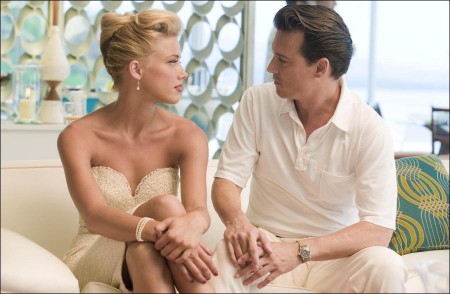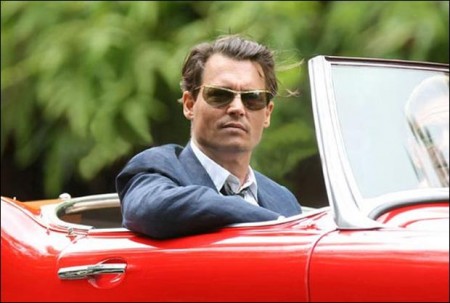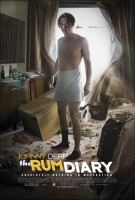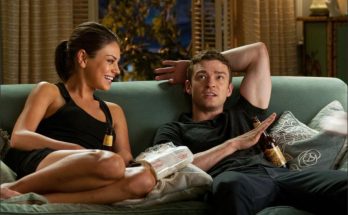Taglines: Absolutely nothing in moderation.
Begun in 1959 by a then-twenty-two-year-old Hunter S. Thompson, The Rum Diary details the life and events of Paul Kemp, a freelance journalist who finds himself at a critical turning point in his life while writing for a run-down newspaper in the Caribbean. Paul is challenged on many levels as he tries to carve out a more secure niche for himself amidst a group of lost souls all bent on self-destruction. Thompson delivers a potent story that pushes the sometimes brutal truth of human relations into your face in such a way that it would be absurd to not laugh.
Based on the debut novel by Hunter S. Thompson, The Rum Diary tells the increasingly unhinged story of itinerant journalist Paul Kemp (Johnny Depp). Tiring of the noise and madness of New York and the crushing conventions of late Eisenhower-era America, Kemp travels to the pristine island of Puerto Rico to write for a local newspaper, The San Juan Star, run by downtrodden editor Lotterman (Richard Jenkins).
Adopting the rum-soaked life of the island, Paul soon becomes obsessed with Chenault (Amber Heard), the wildly attractive Connecticut-born fiancée of Sanderson (Aaron Eckhart). Sanderson, a businessman involved in shady property development deals, is one of a growing number of American entrepreneurs who are determined to convert Puerto Rico into a capitalist paradise in service of the wealthy. When Kemp is recruited by Sanderson to write favorably about his latest unsavory scheme, the journalist is presented with a choice: to use his words for the corrupt businessmen’s financial benefit, or use them to take the bastards down.
Adapting “The Rum Story”
“The Rum Diary” had lain forgotten in Thompson’s basement for many years and if not for a fateful visit by Johnny Depp to Thompson’s house, the novel may have never been published. “I came across ‘The Rum Diary’ with Hunter, almost accidentally,” Depp relates. “We were in his house in Woody Creek downstairs in what was called The War Room, and there were just these endless boxes of stuff. I didn’t know what they were, so I started just pulling things out. I stumbled upon what was called ‘The Rum Diary’ and he goes, ‘Oh Jesus, yeah, I wrote that in 1959,’ and I said, ‘Jesus Christ, let’s read this, let’s see what it’s about.’ So we get it out, started reading it. He said, ‘Maybe I should finally publish it.’ I was like, ‘Yeah you should publish it, it’s great.’’’
By that time, however, Thompson’s style had considerably developed from his early writing and returning to his young voice was a challenge. Deborah Fuller, who was Thompson’s secretary for 23 years, recalls, “When it came time to publish “The Rum Diary,” an editor from Simon and Schuster worked with Hunter, but they really had to control him. He had evolved into a whole new writer, and he was embarrassed about some of it and wanted to change it. We all told him that was crazy. He wrote it when he was about twenty. To change it and make this young man’s novel more like his later Gonzo-style would have ruined the flavor.”
Before Thompson had even begun prepping the book to finally see the light of day, a movie adaptation was already cooking in his and Depp’s minds. “From that [first] conversation,” Depp says, “within about 20 minutes we were already talking about the movie rights and how we should produce this film together.”
Thompson died in 2005, too soon to see The Rum Diary brought to the big screen. Producer Graham King wanted to make sure that his legacy would be preserved with the film. “The film is a tribute to Hunter. It was amazing to have the opportunity to get involved in one of his stories, and who better to work with than Johnny Depp?”
Depp had been a long-time fan of director Bruce Robinson and initially approached him to direct another Hunter S. Thompson adaptation. “I met Johnny Depp about twenty years ago because of my first film, Withnail and I,” recalls Robinson “We got together in London. He asked me if I would direct Fear and Loathing in Las Vegas. At the time I had decided that I didn’t really want to direct again. However, if I did, it would only be from a script I had written. By that time, it was too late; the screenplay had already been written.”
Depp was determined to have Robinson and Thompson’s creative spirits eventually cross. As he puts it, “Bruce was always somehow in the back of my mind, and when The Rum Diary came up I said, ‘what about Bruce Robinson?’ Hunter said, ‘That’s the ticket, man.’ Hunter was truly into it, especially the fact that we had to get Bruce out of retirement!” Graham King agrees: “Withnail and I is one of my favorite movies. I knew Bruce and Johnny would make a very magical team.”
“Then later, Johnny sent me a copy of ‘The Rum Diary’ and asked if I would be interested in adapting it into a screenplay,” says Robinson. “It was a nightmare at first. I couldn’t see how it could be adapted as a film as it has two lead characters, Yeamon and Kemp. It was a long time before I realized what Hunter had actually done, which was to split himself down the middle into two characters. When I realized Yeamon was just a facet of Kemp, one of them had to go. Once I had solved that problem, I could see a way to write it, and decided to have a go.”
Depp recalls Robinson’s epiphany with equal enthusiasm. “Finally it came to him, which none of us ever recognized. Weirdly, Hunter said something to me years before that I hadn’t remembered. Early on, Hunter had said, ‘I should have you know I should have made these guys one, I should have made them me—but I made them both me.’ That’s what Bruce did. He had the instinct to make that happen.”
“The way I approached the adaptation of ‘The Rum Diary’ was to absorb what the book was, and then rewrite it,” Robinson says. “There are only three lines that Hunter wrote in the whole script. I wasn’t trying to copy him. You can’t because he was so unique, but hopefully, I was writing in his vernacular.” Depp says that is exactly what Thompson wanted all along. “Bruce definitely went off page in terms of the book, but Hunter wanted to. He always wanted to. Hunter even talked to me about maybe taking this story to Cuba!”
In addition to combining the characters of Kemp and Yeamon into one, the screenplay departs from the book in the way it deals with the representation of Puerto Rico. “That’s a fundamental change in the movie, because the whole film is in support of the underdog side of Puerto Rico,” says Robinson. “It’s critical of the people who have come there to make a fast buck. Sanderson’s approach is almost like the old-time British imperialists, who pillaged a country for what they could get and then moved on.”
It took Robinson about five to six months to write the screenplay. “When I got the word back that they were going to make it, I was thrilled,” says Robinson. “However, when they asked me to direct it, I wasn’t, because I didn’t want to,” he laughs. “After the last unmentionable film I directed, I was really determined that I would never do it again. I don’t like being in the public eye. I much prefer being locked in a room with a typewriter doing what I do, which is to write. So it wouldn’t have been difficult to say no, but because I liked the script myself, and because it was for Johnny, whom I like enormously, I thought I would give it a shot.”
King couldn’t have been more pleased with Robinson’s return to the director’s chair. “He’s got such an easygoing, come-what-may attitude behind the monitor. The DP was actually saying, ‘Maybe you should try this,’ and Bruce said ‘No, I’ve got it. I’ve got what I need. The movie’s in my head, so I know in the edit room I’m not going to be using this scene; why are we going to shoot it?’ That’s music to a producer’s ears! He commanded that crew so well. He’s such a soft spoken, gentle guy. Everyone loved and respected him.”
Robinson first became a fan of Hunter S. Thompson’s work in the early seventies. “My flat-mate flung a book at me and told me to read it,” recalls Robinson. “It was “Fear and Loathing.” I am not making comparisons, but I thought, ‘Jesus Christ, this guy is the kind of writer I want to be.’ I became an enormous fan because he spoke to my generation. He had managed to break out of the sterility of political coverage that had become so used to deference and innuendo, rather than the truth.”
“Hunter went in there roaring and raging,” Robinson says. “He always seemed like a hip Orwell to me. He spoke those same truths that I perceived in Orwell. He would always go for the jugular. I write quite a lot of political stuff myself and it’s an area that fascinates me. Hunter was a past master of the performance of the political and that’s what I always loved about him.”
“The thing that I initially connected with in regard to Hunter’s work was his honesty,” Depp says. “You read about these amazing experiences and you think, ‘That’s bullshit, it’s his imagination,’ but when you’ve lived with him, really spent time with him as I have, you realize that it’s all really true and more.”
For both Depp and Robinson, the core of The Rum Diary was the film serving as an origin story for Thompson. “It’s before Hunter became Hunter, or rather, it’s before Hunter Thompson became Dr. Hunter S. Thompson,” says Depp. “You start to see and feel and understand the elements that lead him to become Raoul Duke in Fear and Loathing in Las Vegas.”
“There is a line in the movie where [Paul Kemp] says, ‘I’ve got no voice, I don’t know how to write like myself,’” says Robinson. “Although he is a writer, we never see him hitting the keys of a typewriter until the last fifteen minutes of the movie. That’s when he has found his voice. Found his inimitable rage.”
Graham King found the humor and adventurousness to be among the most enticing aspects of the story. “People talk to me about it and they say, ‘This is going to be a dark story.’ It’s very Hunter and they go back to Fear and Loathing, but that’s not what this story is. It’s a lot of fun, it’s a fantastic ride!”
The Characters and the Crew
It goes without saying that Depp was the perfect fit for the part of Paul Kemp. “There’s no actor who was closer to Hunter Thompson than Johnny Depp,” Graham King says. But although Paul Kemp is loosely based on Hunter S. Thompson as a young man, Bruce Robinson wanted for the character to come out of Depp’s interpretation of Thompson, not an imitation of the writer in later years. “I wanted Paul Kemp to be Johnny Depp playing Hunter, but not with the shorts and the bald head,” says Robinson. “The film is set in the late fifties and very early sixties, so, in a sense, this is a very straight romantic lead. For all the comedic exuberance of Fear and Loathing, this is a straight drama. Hunter was very handsome when he was young, and Johnny is an incredibly handsome leading man.”
“Johnny transformed himself into Kemp very easily,” adds King. “He adds layers and layers to a character. He makes a raised eyebrow hysterical. He’s very subtle at what he does. Bruce had the easiest job directing Johnny, because you don’t really need to tell him as an actor what to do. You don’t really need to tell him how to deliver a line, especially a comedic line.”
Depp, like Robinson, wanted to tap into the idea of Thompson as a young, unformed artist. “The way I approached it was that the character of Paul Kemp is Raoul Duke as he was learning to speak. It was like playing the same character, only 15 years before. This guy’s got something; there’s an energy burning underneath it, it’s just ready to pop up, shoot out.”
When Kemp begins working at the San Juan Star, he immediately strikes up a friendship with Sala, the news photographer who works there. Robinson was looking for a very particular quality when he was casting this role. “I wanted someone relatively unknown, but who was a really great actor. Michael Rispoli fit the bill,” says Robinson. “Sala is somebody who came to San Juan ten years earlier. He was a photographer, probably not without talent. He became absorbed into the place, elevated by it, and then almost destroyed by it. One of the reasons I cast Michael was that I was looking for that sense of inability to escape. I wanted an actor who the audience would look at and think: ‘He’s not getting out of here, he can’t leave.’ A lot of the people who read for the part were superb actors, but when Kemp leaves at the end of the story, they were going with him.” “Bruce called me and said, ‘I’ve found him!’ Depp says. “As soon as I saw the tape, it was instant—that’s the guy. He looked, sounded and felt exactly like the part of this expatriate American down in Puerto Rico, lost and trying to figure out what he wanted to do with his life.”
Robinson had no doubt about whom he wanted to play Sanderson. “Aaron Eckhart was my first and only choice,” he says. “He is a very good actor, and he has a kind of cruel beauty about him. He is also a complete contrast to Johnny Depp. He is handsome in an Aryan way. Johnny is Latin handsome. Sanderson is a property developer who has attachments to the newspaper, both financially and editorially. He is utterly charming and utterly ruthless.” Depp was impressed by Eckhart’s intense commitment to the role. “He absolutely just scrubbed us all. He took the role by the throat and went with it.”
“When I set to cast the role of Chenault, I was looking for someone with a lascivious edge,” says Robinson. “In the book Chenault is Yeamon’s girlfriend, but as I said, the Yeamon character is gone. I made her Sanderson’s girlfriend to heighten the dramatic tension. You immediately get some heat and drama out of the fact that the girl is utterly unobtainable. The whole book is about the American dream, and Hunter’s obsession with lifting the lid on the dream. Chenault is attached to the man who is exploiting the dream. Kemp is crazy in love with her because she is as unobtainable as the dream.” That unobtainable quality is what attracted Depp to Heard. “She was like this incredible 1950s movie star, but with a deep rooted poetry to her. There was a mystery there; you couldn’t quite understand what had gone on in her life, but it made you want to ask questions that you wouldn’t normally ask.”
“There is quite a sexy love scene, but in the middle of it, Kemp is interrupted,” says Robinson. “He has to choose between saving the newspaper, and in turn his writing, or this incredibly beautiful girl, whom he’s about to have sex with. He chooses the words, which I think is very Hunter-esque.”
The character of Moberg was interesting to cast. “In the book, he is described as being Swedish, but I decided to make him an American,” says Robinson. “Giovanni Ribisi is such a fine actor. On the set he looked like a derelict,” he laughs. “I think Giovanni brings comic relief to the driving force of the movie.”
Depp was adamant about Ribisi’s involvement from the outset. “We worked together on Public Enemies and I just thoroughly fell in love with him. I knew then that I wanted this guy on The Rum Diary somewhere. ‘I don’t care what he does, I just want him there. I want to work with him again.’ What a pleasure, what a gift. I salute the guy endlessly; he’s just wonderful.” “As an actor, I really appreciated the details that Giovanni added to his character,” says Robinson admiringly. “He came up with something, which was a complete invention. It was absolutely ridiculous, but beautiful. He picked up an ashtray and emptied the entire thing into the shopping bag, which he always carries. It was just in case there are a few butts in there that may come in handy. It was a piece of pure on-the-spot comic invention.”
“Moberg is the crime and religious correspondent at the newspaper,” Ribisi says of his character. “I think he was really angry with capitalism in America,what they were doing. He started seeing the results of that on the Puerto Rican culture. Although he despises Lotterman [San Juan Star’s editor], he feels that being with the newspaper does give him a chance to have a voice as a journalist.” “I think when Moberg first meets Kemp,” says Ribisi, “he thinks Kemp is someone he can possibly take advantage of. There is some degree of skepticism that Kemp is just another guy coming in. However, when he begins to talk about revolting and putting out the newspaper themselves, it electrifies Moberg. He starts to wake up, and become really passionate about it. That was my own little arc that I was trying to add in.”
Moberg is responsible for encouraging the alcohol and drug abuse in his amigos, Kemp and Sala. “There was this new concept of altering your mind with certain substances. I think Moberg had been doing that for a long time,” says Ribisi. “He also scavenges filters from the rum distillery and produces the moonshine that they drink, which is about four hundred and seventy proof, if that’s possible!” he laughs.
In order to find the character, Ribisi looked to the screenplay. “There are so many ways to approach or build a character, because you have so many different genres. For this character, it was the idea of getting seated in his outward physical appearance. The way he sounded, the way he walked.” Graham King especially loved Ribisi’s voice. “I told him on set that the voice he puts on reminded me of Rizzo in Midnight Cowboy!”
For the role of San Juan Star editor Lotterman, Robinson chose character actor Richard Jenkins. “He played the role brilliantly,” says Robinson. “Lotterman is a hysterical old-style journo, who was probably a sub at The Baltimore Sun for 40 years. Now he is a seething nervous wreck, trying to run his own newspaper, and trying to hold it all together. There’s a scene at the beginning of the movie, which I hope will be amusing, when Lotterman explains to Kemp that he is looking for some fresh blood to make the thing work, and he believes Kemp is the man that can do it. However, the whole place is awash with rum! It’s not by accident that it is called The Rum Diary. Everyone’s completely smashed all the way through the movie!” laughs Robinson.
Depp remembers the initial struggle to find the right actor to play Lotterman. “‘Who in the world can we get to play this part?’” he recalls saying. “We went through a few names here and there—‘Nah, nah, nah, they don’t seem right; he’s too pushy, he’s too this, he’s too that.’ And then bang, suddenly Richard Jenkins came to mind and we were like, ‘We’ll never get him.’ Boom, got him! We just offered him the part and got him! It was miraculous. He came in and kicked it straight in the ass. He’s the most solid rock that everything revolves around. It’s because of him that everyone works in terms of character, how far you go and how far you don’t go, what you hold back and what you give out. It’s because of Richard Jenkins’s gravitas that a character like Giovanni Ribisi’s coming in there works.”
When it came to casting Zimburger, the ultra-powerful and poisonously corrupt former military man who’s in cahoots with Sanderson, Robinson had a few actors in mind, but Bill Smitrovich grabbed his attention during an audition. “He was doing the read-through, and I was sitting with Denise Charmian, the casting director,” Robinson says. “I was whispering something to her, and in the middle of it, still in character, Zimburger told me to ‘shut the fuck up’ and carried on. It was electric!”
“Bill plays this kind of John Birch society character that made Nixon, or even Bush, look like a limp-wristed liberal,” says Robinson. “A maniac who can only think in mega tons, and ‘wiping out the Soviet Union before they wipe us out’. Bill has a very potent comic streak, and he really delivered the goods.”
Once the casting of the actors was complete, the task fell to co-producer/first assistant director Peter Kohn to surround Robinson with a crew who could support him. “At the outset of this film in September 2008, Johnny and Bruce asked me to come on board,” says Kohn. “Between Johnny’s recent experiences on Pirates, Sweeney Todd, and Public Enemies, he’s collected a group of people whom he loves working with, and who bring a lot to the table. Having known Bruce for so long, I knew his style. I knew Johnny and I would be able to provide a crew that he would love.”
Robinson agrees wholeheartedly, “There genuinely isn’t a single member of the crew that I didn’t feel was magic. I really adored all of them. They were so good at what they do.”
“It really helped to have those working relationships established,” says Kohn. “On day one we slipped right into gear. We brought in our department heads, then filled in the rest of the positions with local crew, who had also worked with each other on many other productions. Bruce is extremely decisive and specific about what he wants. He doesn’t do endless numbers of takes or over cover everything. It allowed us to be very efficient and to spend the money where it is needed.”
The Rum Diary
Directed by: Bruce Robinson
Starring: Johnny Depp, Amber Heard, Aaron Eckhart, Giovanni Ribisi, Richard Jenkins, Natalia Rivera, Julian Holloway
Screenplay by: Bruce Robinson, Hunter S. Thompson
Production Design by: Chris Seagers
Cinematography by: Dariusz Wolski
Film Editing by: Carol Littleton
Costume Design by: Colleen Atwood
Set Decoration by: Rosemary Brandenburg
Art Direction by: Dawn Swiderski
Music by: Christopher Young
MPAA Rating: R for Language, brief drug use and sexuality.
Studio: FilmDistrict
Release Date: October 28, 2011
Hits: 98






